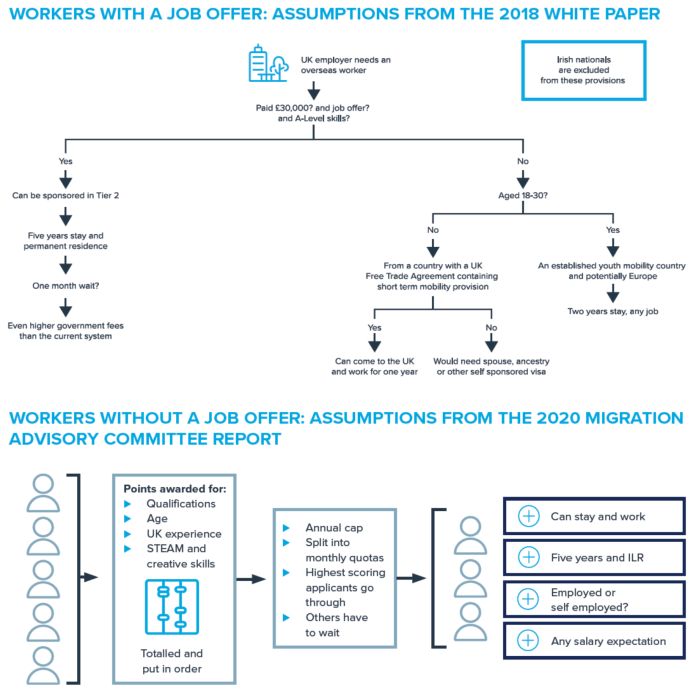Migration Advisory Committee Publishes Report On Post-Brexit Immigration System
•The UK Migration Advisory Committee (MAC) has published a report advising on a post-Brexit immigration system for the United Kingdom, specifically on an ‘Australian points-based system' and salary
United States
Immigration
The situation
The UK Migration Advisory Committee has published a report
advising on a post-Brexit immigration system for the United
Kingdom, specifically on an 'Australian points-based
system' and salary thresholds.
A closer look
Key recommendations include the following:
|
Topic |
Recommendations |
|
Maintaining current Tier 2 (General) category for
workers with a job offer
|
-
The current framework for Tier 2 (General) as a work visa
requiring a job offer should continue, as should plans to remove
the Resident Labour Market Test and the annual limit on new
entrants. This will make the category more certain and cut two to
three months from the lead time for Tier 2 (General) category.
|
|
Creating a new points-based system for workers without a
job offer
|
-
Modify the Tier 1 (Exceptional Talent) to focus more on those
with exceptional promise rather than an established track record,
and move away from the current system of endorsement to a
points-based assessment focusing on age and qualifications, among
other criteria.
-
Applicants could express an interest in coming to the United
Kingdom and would be awarded points for certain characteristics,
for instance qualifications and science, technology, engineering
and math (STEM) skills.
-
Monthly allocations of visas would be available (derived from an
annual limit on numbers) with the highest-scoring applicants
awarded a visa and others waiting for subsequent months.
|
|
Amending salary thresholds
|
-
Reduce the minimum salary requirement for the Tier 2 (General)
visa category from GBP 30,000 to approximately GBP 25,600.
-
Exclude allowances and bonuses from the salary calculation,
where these can currently be included.
-
Maintain a single national salary threshold rather than
introducing regional salary thresholds.
|
|
Expanding new entrants
|
-
Reduce the percentage for new entrants' salary by 30
percent.
-
Widen the definition of a new entrant to include not only those
applicants under the age of 26 and those switching from a student
visa, but also those who are working toward recognised professional
qualifications and those who are moving directly into postdoctoral
positions.
|
|
Other recommendations
|
-
A pause to the proposed increase to the settlement salary
threshold and a full review to possibly introduce a more flexible
system for granting settlement.
-
Future consideration to introduce a separate salary threshold
for Northern Ireland.
-
Possibly introduce a pilot visa to attract foreign talent to
'remote' areas.
|
|
Evaluation
|
|
Impact
The report has no direct impact on employers and foreign
nationals in the United Kingdom, as the government is not obliged
to follow the MAC's findings. However, since MAC
recommendations typically have a considerable impact in shaping the
government's policy, this report serves as a further indication
on what the UK immigration system will look like as of 2021.
Background
The UK Home Secretary requested this report in 2019. The current
UK immigration system was set up as a points-based system in 2008
but evolved away from a true points-based approach over the
years.
Looking ahead
Fragomen anticipates the new immigration system to work as
described below:

Next steps include the following:
- White paper. The
Home Office (Ministry of Internal Affairs) is expected to publish a
White Paper in March 2020 with policy guidelines which will shape
upcoming legislative proposals on the UK immigration system.
- Legislative process.
The new immigration system is scheduled to take effect January 1,
2021, leaving limited time to draft, approve and enact relevant
legislation.
The content of this article is intended to provide a general
guide to the subject matter. Specialist advice should be sought
about your specific circumstances.



